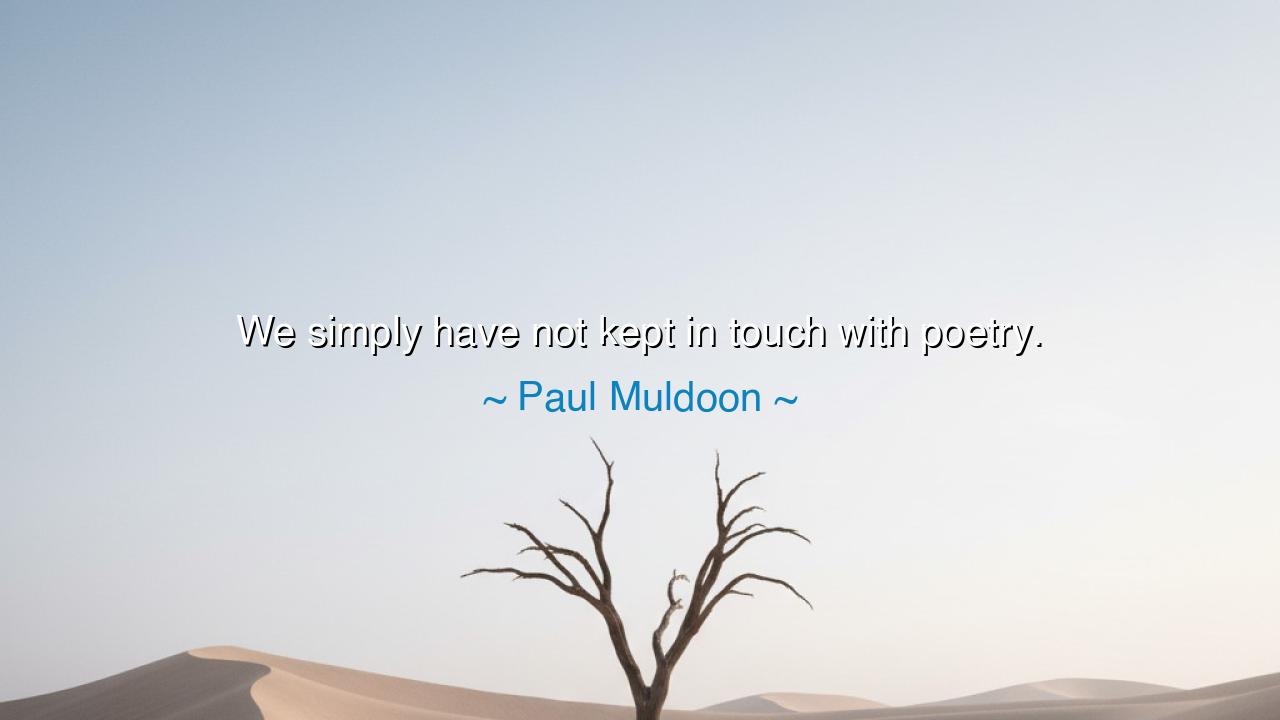
We simply have not kept in touch with poetry.






Hear, O children of memory and seekers of wisdom, the lament of Paul Muldoon, who declared: “We simply have not kept in touch with poetry.” In this brief but piercing truth, he names a sorrow of our age: that though poetry flows all around us like a river, we have wandered far from its banks. Humanity, once nurtured by verse in song, prayer, and story, has allowed the noise of haste and the glitter of distraction to sever the sacred bond.
For once, poetry was woven into the daily fabric of life. The ancients sang it in temples and taverns, in battlefields and marketplaces. The words of Homer were not read in classrooms but recited by the fire; the Psalms were not bound in leather but lifted as hymns to heaven. In every culture, poetry was breath itself—the language of prayer, lament, joy, and memory. To lose touch with poetry, then, is not to lose a pastime, but to lose contact with the marrow of what makes us human.
Muldoon’s words are not accusation alone, but diagnosis. We have traded depth for speed, reflection for distraction. In a world of screens and commerce, poetry seems too slow, too quiet, too demanding of the heart. But this is illusion. For in neglecting poetry, we have not banished it—we have banished ourselves from one of our oldest companions. Poetry still waits patiently, carrying within it the wisdom of centuries, the music of our ancestors, the mirror of our souls.
Consider the fate of Sappho, whose verses once lit the hearts of her people but now survive in fragments. Yet even those fragments, carried across millennia, still ignite passion and longing. How much poorer would we be if her voice had been entirely silenced? Or remember the Harlem Renaissance, when poets like Langston Hughes reawakened a people’s dignity with words that moved as powerfully as drums. These are reminders that when we return to poetry, it returns to us with gifts that transcend time.
Muldoon, as an Irish poet, speaks too from a tradition where verse was once the very lifeblood of the people. Ireland’s bards were keepers of memory, truth, and identity. To “keep in touch with poetry” was to keep in touch with one’s people, one’s history, one’s very soul. Thus his lament is sharpened by history: when poetry is abandoned, something greater than art is lost—it is heritage, identity, and the shared heartbeat of a community.
Yet despair is not the end of his teaching. To say we have not kept in touch is also to imply that we can. The thread has not been broken, only neglected. Poetry waits in the pages of books, in the songs of our people, in the quiet moments of thought. It does not demand perfection—only attention. To pick up a poem, to whisper it aloud, to let its rhythm awaken something forgotten in us, is already to restore contact.
Therefore, O seekers, the lesson is this: keep in touch with poetry, as you would with an old friend. Give it time in your days, not as duty but as nourishment. Read aloud the verses of the past, write your own lines even if no one will see them, listen for the poetry hidden in the world around you—the birdsong, the heartbeat, the silence between words. For poetry is not dead; it is we who fall asleep. To awaken again is simple: open the heart, and let the words flow in.
So remember Muldoon’s wisdom: “We simply have not kept in touch with poetry.” Let this not be your fate. Seek it, embrace it, and it will restore to you what is ancient and eternal. For to return to poetry is to return to ourselves, and in doing so, to rediscover the forgotten depth of life.






AAdministratorAdministrator
Welcome, honored guests. Please leave a comment, we will respond soon